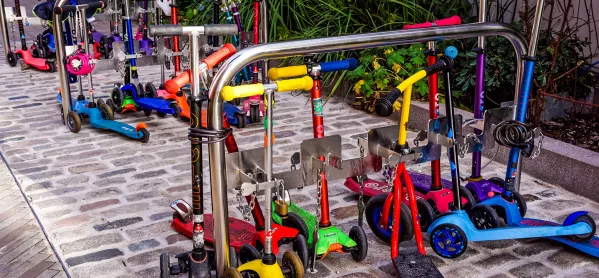
- Home
- Analysis
- Early Years
- Reception pupils in nappies reveals societal challenges
Reception pupils in nappies reveals societal challenges

Last September, from a cohort of 450 children starting in Reception classes across our trust, 30 were still wearing nappies.
That’s the equivalent of one whole class of Reception children still not toilet-trained. While the issue is (thankfully) not confined to one class, the impact has been felt harder in some settings than others, such as one school that has four children in Year 1 still unable to use the toilet.
Meanwhile, another school has introduced a nappy rota to share the burden equally across staff, and “a hygiene room” is being introduced, taking more of the already limited funding out of education and, in turn, reducing the amount of play space.
Reception children not school-ready
I have been a teacher for 30 years and when I was a Reception teacher at the start of the millennium, there were “accidents”, of course, but it was unheard of for a child to come to school not being able to use a toilet or still wearing a nappy.
It’s not just toilet training where issues are apparent either. Some children struggle to hold a spoon, so they can’t feed themselves. Many have very poor dental hygiene and so “how to use a toothbrush” has been introduced to the curriculum.
In some cases, speech and language is so poor that there has been Makaton training for staff to tackle this.
These are not children with identified issues, either, even though we know there are more children with complex needs attending our mainstream schools.
Disconnect between teachers and parents
We know we are not alone in facing these issues - something a report this week from Kindred² made clear.
It found a growing disconnect between schools and parents in their perceptions of school-readiness, with teachers believing that 35 per cent of children were not ready to start Reception, compared with 91 per cent of parents believing their child was ready for school.
Notably, half of parents (50 per cent) said they believed toilet training their child was not “solely their job”.
It would be easy, then, to blame parents for the situation that trusts like ours are facing. But this is too simplistic and ignores many of the factors that have converged to create the situation that we are now in.
- How do we fix the problem of “school readiness”?
- Nearly half of pupils “not ready” for school
- What do we mean by “school-readiness”?
For one, there has been a huge social shift in terms of what parents see as normal issues for schools to solve.
For example, in many parents’ eyes, it’s normal to send a child to a mainstream school in a nappy, because learning is what school is all about. So it’s the school’s job.
Part of that may have come from Covid and the enforced removal of parent and toddler group interactions, where new parents would learn from others in an informal, friendly atmosphere. Not so much peer pressure as peer information, where a conversation with other parents may have been the catalyst to start tackling issues like toilet training or using cutlery correctly.
However, surely the bigger issue underpinning all of this is the lack of resources and, specifically, the lack of investment in early years support and provision, which means there are now far fewer genuinely helpful groups for parents. Where they do exist, parents are not attending because of cost.
Couple this with the dramatically reduced involvement of health visitors in family life in the very early years - again, because of financial issues and constraints across the health sector - and you have what one of our headteachers described as a “tsunami” of problems battering schools over the past three years, with no indication that things are about to get better.
The need to work together
Heads and staff at our schools, to their great credit, are coming up with creative ideas in mitigation, but this means diverting funds and valuable resources into parent liaison and parent education that should instead go into the frontline teaching and learning of our children.
This is far from ideal. So what is the solution?
For me, a joined-up community approach has got to be the way forward - no sector is sitting on huge pots of money, so we have to collectively pool what we have to support each other and, most importantly, our families.
Knowing our communities is key. If we do that we can work across education, health and other community resources to support our families and ensure that children are ready to learn from day one.
But just as critical is that we need more focus on funding for early years - it is a critical time for development and if we get it right here, we have the best chance of every child having an equitable chance in life.
Gail Brown is CEO of Ebor Academy Trust
For the latest education news and analysis delivered directly to your inbox every weekday morning, sign up to the Tes Daily newsletter
You need a Tes subscription to read this article
Subscribe now to read this article and get other subscriber-only content:
- Unlimited access to all Tes magazine content
- Exclusive subscriber-only stories
- Award-winning email newsletters
- Unlimited access to all Tes magazine content
- Exclusive subscriber-only stories
- Award-winning email newsletters
You need a subscription to read this article
Subscribe now to read this article and get other subscriber-only content, including:
- Unlimited access to all Tes magazine content
- Exclusive subscriber-only stories
- Award-winning email newsletters
- Unlimited access to all Tes magazine content
- Exclusive subscriber-only stories
- Award-winning email newsletters



